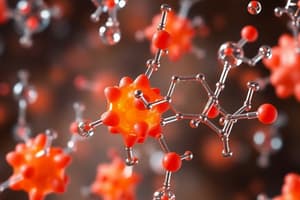Podcast
Questions and Answers
What is the primary focus of biochemistry?
What is the primary focus of biochemistry?
- The physical and biological processes in non-living systems
- The chemical processes and substances within living organisms (correct)
- The biological processes in non-living systems
- The physical processes in non-living systems
What type of reactions are involved in breaking down larger molecules to release energy?
What type of reactions are involved in breaking down larger molecules to release energy?
- Photosynthetic reactions
- Catabolic reactions (correct)
- Homeostatic reactions
- Anabolic reactions
What role do enzymes play in biochemical reactions?
What role do enzymes play in biochemical reactions?
- Enzymes act as catalysts, increasing the rate of reaction (correct)
- Enzymes decrease the activation energy of the reaction without affecting the rate
- Enzymes stop the reaction from occurring
- Enzymes slow down the rate of reaction
What does kinetics refer to in the context of biochemical reactions?
What does kinetics refer to in the context of biochemical reactions?
Which elements can be used in biochemical reactions?
Which elements can be used in biochemical reactions?
What is an anabolic reaction?
What is an anabolic reaction?
What is the primary role of enzymes in biological reactions?
What is the primary role of enzymes in biological reactions?
What is the definition of an acid in biochemistry?
What is the definition of an acid in biochemistry?
Which type of metabolic reactions build larger molecules from smaller ones?
Which type of metabolic reactions build larger molecules from smaller ones?
What is the primary focus of bioenergetics?
What is the primary focus of bioenergetics?
How have studies in biochemistry contributed to our understanding of evolution?
How have studies in biochemistry contributed to our understanding of evolution?
Which statement best summarizes the role of biochemistry?
Which statement best summarizes the role of biochemistry?
Flashcards are hidden until you start studying
Study Notes
Biochemistry is the branch of science that focuses on the chemical processes and substances that occur within living organisms. It is a multidisciplinary field, combining the principles of chemistry, biology, and physics to understand the complex molecular interactions in biological systems. Biochemistry is essential for understanding the fundamental processes of life, such as cellular metabolism, protein synthesis, and gene expression.
-
Elements of Biochemistry: Biochemical systems carry out an enormous variety of chemical reactions with great efficiency. These reactions can be catabolic, breaking down larger molecules to release energy and generate precursors for further reactions, and/or anabolic, combining molecules together to generate biologically useful molecules. The elements used in biochemical reactions must be sufficiently abundant in a form that can be taken up by living things.
-
Chemical Reactions and Enzymes: Biochemical reactions are governed by the same rules as any other chemical reaction. Enzymes are proteins that act as catalysts, lowering the activation energy of the reaction, and increasing the rate of the reaction. Enzymes can achieve an enormous enhancement in the rate of reaction compared with the uncatalyzed reaction.
-
Kinetics and Thermodynamics: Kinetics refers to the rate at which a reaction occurs, while thermodynamics refers to the spontaneity of a reaction. In a biological system, the rate of a reaction is limited by the availability of reactants and the enzymes that catalyze the reaction. Enzyme catalysis is crucial for biological reactions, as the concentrations of reactants in living systems are generally very small and the temperatures are relatively low.
-
Acids and Bases: In biochemistry, acids and bases play essential roles in chemical reactions. An acid is an H+ ion or proton donor, while a base is an H+ ion acceptor. The balance between acids and bases, known as pH, is crucial for maintaining the proper functioning of cells.
-
Metabolism: Metabolism is the set of life-sustaining chemical reactions in an organism. It involves both catabolic and anabolic reactions. Catabolic reactions break down compounds to release energy, while anabolic reactions build larger molecules from smaller ones. The enzymes that catalyze these reactions ensure that they proceed at a useful rate.
-
Bioenergetics: Bioenergetics is a sub-discipline of classical thermodynamics that deals with the flow of energy in biological systems. It is used to determine the direction of metabolic reactions and their equilibrium constants. The energy changes associated with a reaction are used to calculate free energy changes (∆G), which can be used to determine the direction of metabolic reactions and their equilibrium constants.
-
Biochemistry and Evolution: Biochemistry has greatly extended our knowledge of phylogeny and evolution. The study of biomolecules and their functions has revealed the similarities between all living organisms at the molecular level, indicating that all life forms are derived from a common ancestor.
In summary, biochemistry is a vital field of study that provides a molecular understanding of life processes. It combines the principles of chemistry, biology, and physics to explain the complex molecular interactions in living organisms.
Studying That Suits You
Use AI to generate personalized quizzes and flashcards to suit your learning preferences.



